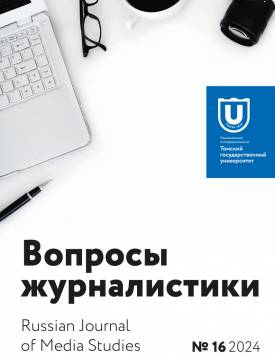“USSR” and the “Soviet”: Representation and reflection of historical memory in a modern literary and local history journal
The article presents the results of analyzing a corpus of texts from a literary and local history journal to explore how historical memory of the Soviet past is represented and reflected. A total of 67 issues of the literary and local history journal Nachalo Veka [Beginning of the Century] were analyzed. This journal is published by the Tomsk Branch of the Union of Writers of Russia and is supported by the Administration of Tomsk Oblast. The journal primarily publishes works of fiction by Tomsk and Siberian authors, along with journalism, historical and local history essays. From the texts published in the journal, 1 204 contexts for the speech unit “Soviet” (in all grammatical forms) and 365 contexts for the speech unit “USSR” were identified. Using the method of qualitative and quantitative content analysis, the dynamic distribution of negative, neutral and positive contexts of the speech unit “Soviet”, as well as the most common variants of conceptualization of the Soviet past through the contexts of using the speech unit “USSR” were determined. The results of the study showed that the most frequently occuring phrases in the studied texts are “Soviet power”, “Soviet Union”, “Soviet person/Soviet people”, and the evaluations of these phenomena range from sharply negative to sharply positive. For example, “Soviet power” is portrayed as cruel and at the same time as fair to people. In addition, “Soviet” can signify both “poor quality” and “high quality”. The dynamic distribution of contexts indicates a growing number of positive mentions of “Soviet” over time, accompanied by a decline in negative mentions. The number of neutral contexts remains relatively unchanged. These dynamics can be interpreted as a result of growing nostalgic public sentiments reflected in local literature and journalism or as part of a broader process of reflecting on the past. The content analysis of the speech unit “USSR” revealed its conceptualization in three main ways: (a) as a belligerent state; (b) as a repressive state; (c) as a state of high culture. At the same time, the collapse of the USSR is evaluated negatively, viewed as a tragedy attributed to both external and internal circumstances. The reflection of the historical past in the texts of the literary and artistic journal is as contradictory as in other sources, and is sometimes built on antitheses. The ambiguity of assessments speaks not only of the pluralism of opinions among the journal’s authors but also of the relatively open editorial policy of Nachalo Veka, allowing the free expression of diverse aspects of historical memory on its pages. The author declares no conflicts of interests.
Keywords
USSR, Soviet Era, literary and local history journals, representation of past, reflection, historical memoryAuthors
| Name | Organization | |
| Vladimirova Sofia B. | Tomsk State University | sophie77@mail.ru |
References

“USSR” and the “Soviet”: Representation and reflection of historical memory in a modern literary and local history journal | Voprosy zhurnalistiki – Russian Journal of Media Studies. 2024. № 16. DOI: 10.17223/26188422/16/5
